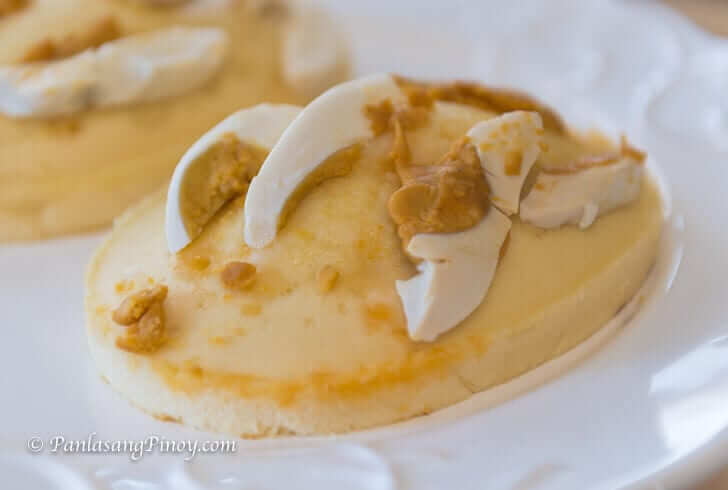Puto Cake
Here is a recipe for puto cake. It might sound new to you, so let me explain what to expect. If you are familiar with puto (which is a type of Filipino small rice cake), this is a bigger version of it. Aside from the size, this version is not dense — in fact, it is soft and lighter than traditional pinoy puto.

If you are looking for a recipe for soft puto, this is a good place to start. The use of cake flour is attributed to the light and soft texture of cake puto. Note that I added slices of salted eggs on top to make it taste better because the recipe was basic and does not call for either vanilla extract or lemon rind. I think that the combination of the cake and salted eggs was a success. Watch the video below to see my facial reaction when I tried it 🙂
Let me quickly give you an idea why it is shaped oval. The mold that I used is responsible for this. Have you tried making leche flan before? I used that very same mold for to make this puto cake.
Ingredients
- 1 1/2 cup evaporated milk
- 2 pieces salted eggs thinly sliced
- 2 raw eggs
- 2 teaspoons Vanilla extract optional
Dry Ingredients
- 1 3/4 cups cake flour
- 3/4 cups granulated white sugar
- 3 teaspoons baking powder
- 1/4 teaspoon salt
Instructions
- Sift the dry ingredients together in a bowl. Mix thoroughly using a wire whisk.
- Gradually pour milk into the mixture while whisking. You can also use a hand mixer, but it is not necessary.
- Add eggs. Continue to whisk until the mixture is well blended and the texture is soft. Note: you can also add vanilla extract in this step if desired.
- Pour the mixture into a mold such as a llanera or round baking pan.
- In a coking pot, boil water for steaming.
- Arrange the llanera mold in a steamer. Cover and steam for 12 minutes.
- Top with salted eggs. Continue to steam for 18 minutes or until it passes the toothpick test.
- Remove from the steamer. Let it cool down.
- Gently take the cake puto out of the mold and arrange in a plate.
- Serve for merienda. This can also be enjoyed with dinuguan.
- Share and enjoy!
Comments
Post a Comment